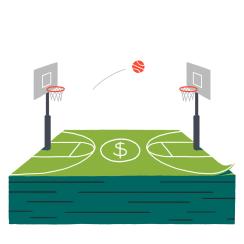
Illustrations by Daniel Savage
When the Supreme Court issued a ruling in May that effectively legalized sports gambling, venture capital firm SeventySix Capital wasted no time getting in on the action.
The firm, which focuses on the sports industry, has made four investments since the ruling, which overturned a 1992 federal law that effectively prohibited commercial sports betting in all but four states, including Nevada.
“Right after May 14, I flew out to San Francisco and then Las Vegas to dig in on a number of companies,” says Wayne Kimmel, a partner at the Conshohocken, Pennsylvania firm.
One of the companies is the Vegas Stats & Information Network (VSiN), an audio/video gambling news service based in Vegas and co-founded by legendary TV sports broadcaster Brent Musburger. SeventySix Capital now has an equity stake.
VSiN is broadcast on its own website, on SiriusXM radio, and on FuboTV, a streaming service with a heavy emphasis on sports.
“The idea is to be the CNBC of sports gambling,” Kimmel says. Just as CNBC serves both hardcore investors and casual viewers, VSiN will serve experienced gamblers — “sharps,” in industry parlance — and channel surfers just looking for entertainment, he says.
As for the sharps, “they love our shows because they’re getting information they can’t get anywhere else,” Kimmel says.
VSiN is just the tip of the iceberg. Casinos, sportsbook operators, media companies that broadcast sports, various kinds of technology companies, and even teams themselves stand to benefit from the sports gambling legalization, analysts say. The surge of investor interest calls to mind the reaction of retail investors following the legalization of marijuana. Estimates for the combined size of legalized sports gambling markets in states across the country go up to about $60 billion a year.
Investors from hedge funds to pension funds are taking advantage. In July, the venerable Canada Pension Plan Investment Board and heavyweight growth-equity firm Technology Crossover Ventures invested in sports data analytics company Sportradar. Also in July, vaunted private equity firm Apax Partners announced its funds were acquiring Genius Sports Group, a sports data technology firm.
“Anytime there is a disruption in the market, there are opportunities,” says Phil de Picciotto, president of sports and entertainment agency Octagon, a unit of advertising giant Interpublic Group of Cos. “This is a potential enhancer very broadly across the board.”
The illegal sports gambling market has grown to $150 billion annually, according to the American Gaming Association. Much of that money will now shift to legitimate entities.
“This is reminiscent of the secondary ticket market,” de Picciotto says. “For a long time, there was unregulated, sometimes illegal scalping going on broadly.” But through the use of ticket marketplaces like StubHub, a unit of eBay, sports teams and sports event owners have been able to capture revenue from ticket resales.
It’s the same thing with sports betting, de Picciotto says. Now, unregulated, sometimes illegal entities — think of your local bookies — are benefiting. “People who haven’t invested in the underlying sports properties are making a lot of money,” he says. “Once this is regulated, the property owners and property rights owners, such as broadcasters, will be the big winners.”
And institutional investors will likely follow the money. In other words, what once was the domain of Tony Soprano and his ilk may soon be coming to a pension fund portfolio near you.
Carlo Santarelli, gaming stock analyst at Deutsche Bank, cites three restraining factors.
First, “there will be no float in legal sports betting, meaning you can’t bet what you don’t have — and yes, that happens,” he wrote in a recent report.
Second, the force of habit — and a relationship with their bookie — will keep some gamblers from going legal. Finally, some won’t be eager to make their financial activity visible to the government.
Perhaps the highest hurdle of all is that each state is responsible for enacting its own sports gambling regulations, so there’s no guarantee that every state will permit it. And it’s not clear how far states that do permit it will go. For example, some may not allow online gambling.
“The legislative rollout will be slow,” says Adam Trivison, a gaming stock analyst at investment manager Gamco Investors in Rye, New York. “It’s important for them to get regulations and taxes right to maximize market potential.”
Five states already have joined Nevada in legalizing sports gambling since the Supreme Court decision: Delaware, Mississippi, New Jersey, New Mexico, and West Virginia. Three other states have passed bills to allow sports betting, and such bills have been introduced in 15 other states. Leagues would prefer unified federal regulation, but that may be a long shot.
Then there’s the question of how to make money from legalization. Casino companies would seem to be obvious beneficiaries of the legalizations, especially in states that don’t allow gambling on mobile devices. “Where there isn’t a mobile alternative, brick and mortar could be a nice traffic driver,” Santarelli says.
Analysts say the list of potential winners includes MGM Resorts International, Caesars Entertainment Corp., Penn National Gaming Inc., Boyd Gaming Corp., Eldorado Resorts Inc., and Churchill Downs Inc. In July, the NBA named MGM Resorts its official gaming partner, agreeing to provide the casino company with its data. And in October, the NHL did the same. Those moves give MGM a branding opportunity in addition to potential gambling revenue.
That said, experts say sports gambling won’t directly boost casinos’ fortunes by much, as it accounts for only 2.5 percent of casinos’ revenue in Nevada, according to David Schwartz, director of the Center for Gaming Research at the University of Nevada, Las Vegas. The real benefit to casinos will be the increased traffic sports gambling will bring and the money those people will spend in more profitable areas.
The existing visitor base for regional casinos tends to be middle-aged people, predominately women, playing slot machines, which provides little revenue to the casinos, Trivison notes. Sports betting attracts a younger, male demographic. Those customers generally play table games, which provide more revenue than slots, he says.
“They create an atmosphere of something happening,” Trivison says. “That’s really important for regional casinos.”
Companies that can run casinos’ sportsbooks also stand to gain, analysts say. They cite several European companies that do so, including William Hill Plc of London, Paddy Power Betfair of Dublin, and Ladbrokes of London, a unit of GVC Holdings Plc. Those have a good opportunity to enter the U.S. sports market, analysts say. Already, in July, GVC announced a $200 million joint venture with MGM Resorts to expand sports betting throughout the U.S.
The companies that make the technology infrastructure for gaming platforms — small, privately held companies that specialize in sports data management — also will thrive, says Bill Squadron, a visiting professor of sports management at Elon University. He cites VSiN, The Action Network, and Genius Sports, where he’s special counsel.
Many investors view data analytics as a valuable asset, says Irwin Raij, sports industry group co-chair at law firm O’Melveny & Myers. “That’s why a lot of people are jumping in,” he says.
Not every sports gambler is going to abandon his corner-store bookie. But the investment opportunities created by sports gambling’s legalization are flowing into a wide range of industries — and appealing to a wider range of investors.

There’s yet another way legalized gambling will create opportunities. Sports team valuations have exploded in recent years, with the NFL’s Carolina Panthers selling for $2.2 billion in May. Legalization will only put more upward pressure on these valuations, providing plenty of revenue opportunities for sports leagues, analysts say.
“Leagues are looking for ways to monetize” their product, says Andrew Brandt, executive director of the Moorad Center for the Study of Sports Law at Villanova University and a former Green Bay Packers executive. “I think every team is looking under every nook and cranny to find a revenue stream, and this is a big one.”
Sports gambling will lift team valuations significantly, he says. “It’s an incredible fan engagement tool that will raise interest and TV contracts.”
There are myriad ways fans could bet on games — from the final result to any single element, such as whether a basketball player will make a free throw. Betting could ultimately be offered to fans at stadiums.
“With technology evolving, I won’t be surprised to see people do it from mobile devices,” says Robert Caporale, chair of sports investment bank Game Plan in Miami Beach.
And teams are looking to get a piece of the action. The NBA is pushing for a 1 percent take of all the money bet on its games, though companies with gambling platforms aren’t too happy about that request, given their small profit margins. “It’s all a question of the split, just like between movie theaters and film distributors,” says Michael Breit, a managing partner at EisnerAmper, an accounting and consulting firm in New York City.
In any case, gambling companies could sponsor leagues and individual teams. In September, the Dallas Cowboys became the first NFL team to sign a sponsorship deal with a casino: WinStar World Casino and Resort in Thackerville, Oklahoma, owned by the Chickasaw Nation.
The gambling legalization “creates a whole new category for sponsorships and advertising as big as autos and beer,” Squadron says.
The most valuable assets for leagues and teams when it comes to wagering is the data about games, players, and other factors they control, says Christopher Marangi, a portfolio manager at Gamco Investors. After all, gambling platforms and bettors need data for the system to function. But conflicts are brewing as to how much ownership rights leagues and teams have over their data.
At any rate, it’s not just teams that will benefit from the sports gambling boom. “It could increase ratings and thus ad revenue for major holders of major sports media rights, such as broadcast networks and regional sports networks,” Marangi says.
Sportscasters who could only hint at gambling topics, such as point spreads, in their commentaries before will now be able to address those issues directly, which should appeal to fans, Brandt says.
For now, the gambling focus will be on the most popular spectator sports, such as football and basketball, analysts say. “But eventually gambling will provide significant benefits for second-tier sports,” Squadron says. “In England, people bet on second-division badminton. Here it could be lacrosse or bowling.”
So as sports gambling turns legit, investors have plenty of reasons not to quit. “This is an exciting time to invest in this space,” says Kimmel of SeventySix Capital. “We believe the market will far exceed expectations.”





